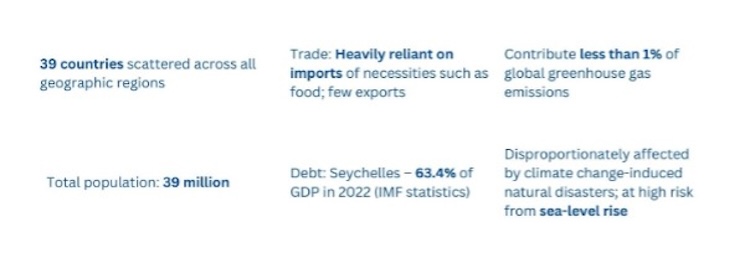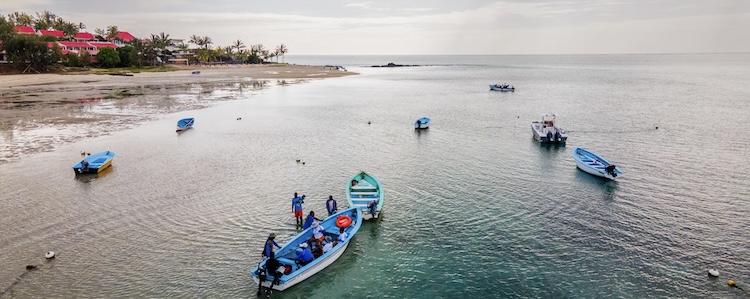By Amanda K Serumaga
The author is the UNDP Resident Representative, Mauritius and Seychelles.
VICTORIA| 30 May 2024 (IDN) — An archipelago of 115 islands in the Indian Ocean, Seychelles has a population of just over 100,000 in an area covering 457 square kilometres. But while it is classified as a high-income country, this Small Island Developing State (SIDS) is extremely vulnerable to the impacts of climate change and an economy largely reliant on tourism and fisheries.
Because of its high-income status, its challenges are often overlooked. Seychelles does not qualify for development assistance, and borrowing to diversify its economy is very expensive. This is the case for many SIDS countries struggling to diversify their economies while dealing with the outsized impacts of the climate crisis and spiraling debt.
Low lying and without many natural resources, SIDS countries are extremely vulnerable to the impacts of climate change and rising sea levels. Yet perhaps because of the unique challenges they face, these 39 countries have become sustainable development innovators—modeling new approaches to resilience-focused national planning.

The government has used the country’s vulnerabilities as a platform to champion conversations about changing the narrative on development financing. The timing is ripe for these conversations as the 4th International Conference on Small Island Developing States (SIDS4) taking place in Antigua and Barbuda from 27-30 May 2024.
With the theme of ‘Charting the Course Toward Resilient Prosperity’, SIDS4 brings together UN organizations, governments, NGOs, civil society, academic institutions, the private sector, IFIs and other partners towards in the next 10-year Plan of Action for SIDS (2024-2034).
A model for positive country-led action
Integrated National Financing Frameworks (INFFs) are used by countries to strengthen financial planning and devise strategies for mobilizing public and private finance towards their sustainable development objectives. They lay out where the capital for sustainability will come from and the initiatives it will be channeled into. More than 85 countries are shaping national financial planning through INFF processes.
In Seychelles, the government is using the INFF approach to look at policy, regulatory and other changes necessary to diversify the economy and make it more resilient. At the government’s request, UNDP contributed its expertise to develop an understanding the country’s financial ecosystem, including in the public and private-sector, and spurring private investment while mobilizing public resources for sustainability. This work is built on a UNDP diagnostic assessment of the impact of COVID-19 on the economy and research on empowering the private sector to diversify the economy.
The INFF process included an SDG Investor Map under the leadership of the Ministry of Investment, which identified investment opportunities to mobilize private capital. A Development Finance Assessment elaborated the country’s financing landscape and readiness to take advantage of emerging financing opportunities. Based on this assessment’s recommendations, plans are underway to establish a national financing framework guided by an inter-agency committee under the leadership of the Minister of Finance.
Next steps
Subsequent efforts have involved collaborative engagements among UN Agencies such as UNDESA, UNITAR and the UN Economic Commission for Africa, which are actively supporting INFF processes (the most recent of these efforts was to build public-sector capacity for systems thinking).
The public sector is also critical in mobilizing capital for sustainable development through effective taxation systems. UNDP’s Tax for SDGs team worked with the government on tax governance and enhancing capacity for taxpayer audits. Through Tax Inspectors without Borders, UNDP and OECD assisted the government strengthening its institutional architecture for generating revenue through taxation. To minimize leaks in the taxation system, UNDP provided support in tackling tax crime and conducting criminal investigations.
Seychelles is now sharing its INFF experience with other SIDS countries. At SIDS4, a side event hosted by government and the multi-partner INFF Facility will focus on unlocking financing for climate targets in the unique SIDS context through INFFs.
This event will be a platform for Seychelles and other SIDS countries to showcase the positive change possible when all actors focus on mobilizing the financing needed for climate action. It will also demonstrate UNDP’s special role in bringing together many partners to transform the challenges SIDS countries face into innovative financing opportunities. [IDN-InDepthNews]
Photo: The Seychelles government has used the country’s vulnerabilities to champion conversations about changing the narrative on development financing. Credit: UNDP Seychelles.


